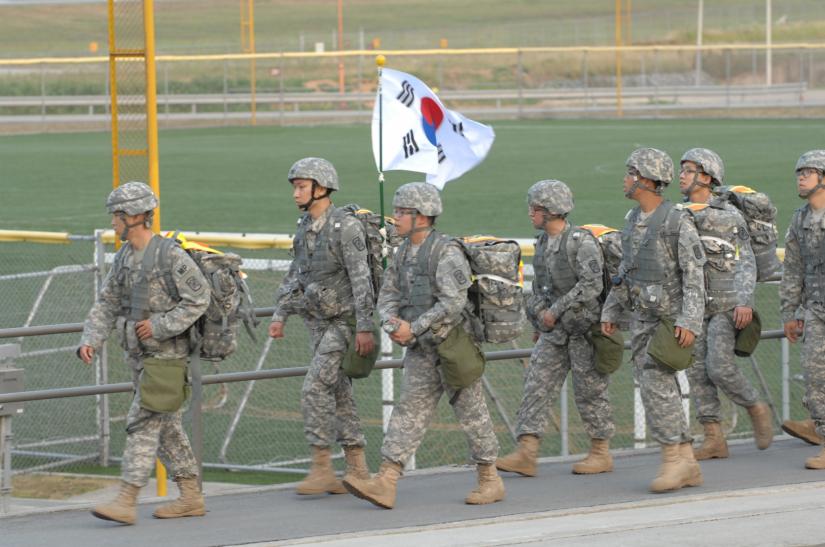 A rift is deepening between South Korea and Japan over what happened during WWII. Japan as occupiers of the Korean Peninsula forced Koreans into work. The issue has always stirred up deep emotions between S. Korea and Japan but the simmering tension has recently escalated, AS a South Korean man set himself on fire outside the Japanese embassy in Seoul recently.
A rift is deepening between South Korea and Japan over what happened during WWII. Japan as occupiers of the Korean Peninsula forced Koreans into work. The issue has always stirred up deep emotions between S. Korea and Japan but the simmering tension has recently escalated, AS a South Korean man set himself on fire outside the Japanese embassy in Seoul recently.
His death followed Japan’s ban on some exports to S. Korea imposed after a court ruled in October last year that Japanese firms should compensate victims of forced labour during Japan's occupation of the Korean peninsula between 1910 and 1945.
Japan said the issue had already been settled under a 1965 treaty and threatened to introduce visa restrictions and tariffs. Then, this month Japan restricted exports of three chemicals vital to S. Korea’s electronics industries citing national security concerns. So far South Korea hasn’t taken any countermeasures saying it would raise the issue with the World Trade Organization (WTO). But, some Koreans taking the matter into their own hands are already boycotting Japanese products.
As it stands, what had added to the tension as far as S. Korea is concerned? This is certainly deadline that Koreans have heard from the Shinzo Abe administration that the export restriction has nothing to do with the development of S. Korea over what Japanese companies should do with regard to compensating victims or forced labourers during the colonial period.
As far as the government in Seoul and the public are concerned, these two are completely related matters. And, the timing is most extraordinary. the situation only gets worse by the day. For example, Seoul has already rejected a proposal for a third country arbitration that was proposed by Japan. Unfortunately, the damage to bilateral relations is going to be quite severe.
Analysts feel there has been a significant change in the South Korean political landscape. Two years ago, South Korea had a new President-elect Moon Jae-in and one of his campaign promises was actually to revisit the agreement between Japan and Korea to address the issue of comfort women. It was supposed to be final when the agreement was signed in 2015 but the public opposition to this was quite significant. The government currently in Seoul has taken a hard line on the issue. And, they have maintained that they would not see what they perceived to be A turn by the Abe administration towards more right-wing tendencies. There are differences between the two countries not just over the issue of wartime crimes but also over the Takeshima, the rocky islet between Korea and Japan that have been disputed by both for quite some time. On a different note, the U.S.-China trade war has already resulted in a lot of negative shocks for Asian trade flows. One question merits attention: Have the disputes between the two big economies of the region the potential to escalate into another trade war?
On a different note, the U.S.-China trade war has already resulted in a lot of negative shocks for Asian trade flows. One question merits attention: Have the disputes between the two big economies of the region the potential to escalate into another trade war?
It’s worth pointing out that actually South Korea and Japan both have been suffering from the impact of the U.S.-China trade war because they are very much integrated into this global supply chain which is centred around China.
Understandably, when the tariffs are put on the Chinese exports in fact it is South Korea, Taiwan and Japan's high tech areas that feed into that. So, they’ve already been suffering and now they have this bilateral dispute brewing. Analysts contend that one silver lining to this is the export controls involve a review period. There’s A 90-day window during which the two sides might be able to reach some sort of resolution. But, if there isn’t a solution to the impasse, it could make a bad situation much worse.
Japan had said it may escalate measures in August. How far can they actually take this especially given that Japan’s exports have been falling because of the U.S.-China trade war? That’s an interesting consideration. Currently, when we look at these very specialized components, they represent about 1% of the value of Japan’s exports to South Korea. So, things like Hydrogen fluoride are very important to South Korean chip manufacturers and panel manufacturers but they aren’t very important to Japan’s export base.
Indeed, if they start ratcheting-up tensions not only would their own companies suffer as a consequence just as by the way American companies and consumers suffer under tariffs that are just increasing the cost of inputs from China. But, there’s another factor that needs to be considered and that’s South Korea might start retaliating.
So, this is what’s known as the tit-for-tat trade war and if things get more and more heated, the ramifications for these two economies and the global economy could become bigger and bigger.
The timing of the situation is most unfortunate because South Korea was feeling the pressure from the trade war between China and the U.S.
And, there was a lot of hand-wringing domestically over what the government could do to improve the business climate and then came this rule by Japan on top of the existing anti-Japanese sentiment in Korea which is very widespread. It’s put tremendous pressure on the government to not to yield to any demand by the Abe administration. The government has said it is open to diplomatic negotiations or compromise.
There’s certainly the danger that if the matter goes to a Third-party, South Korea might not get the ruling that it wants. It is also the case with the situation of Takeshima which South Korea effectively controls and Japan has increasingly asserted that should be returned to its control. The Japanese have called for Third-party administration or at least to take the matter to the International Court of Justice to resolve it. But, this is an issue that South Koreans have not been interested in pursuing.
Currently, it would be South Korea that would be more vulnerable because its manufacturers are so dependent on those speciality materials from Japan. It is worth pointing out that Japan is not only the source but it is the primary source. It has the right quality that these manufacturers rely on and it’s already integrated into their supply chains. However, it could be that Japan will end up suffering again if this starts to escalate. For example, South Korea remains the second tourist destination for Japan after China which by the way is another country where there’s often these political flare-ups of a cultural/historical nature. So, in that sense, the Japanese economy which is service-based is in fact exposed and could suffer.
Although the Japanese government will say an apology has been given, South Korean talks about compensation. And, of course, money is very important. But, the heart of the matter is not money; it’s about the sincerity of the Japanese government has maintained over years and decades in settling matters of historical significance. This is what offends sensibility in South Korea and more broadly in China and other parts of Asia as well. What Korean public wants to see is a kind of sincere apology and contrition of the kind you often see from the German government with regard to its own wartime crimes but this is certainly not what’s been seen from Japan and that really continues to feed this kind of controversy.
Md. Sharif Hasan teaches International Relations at University of Rajshahi.


